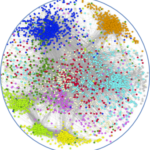Lien vers Pubmed [PMID] – 31861501
Lien DOI – E410.3390/genes11010004
Genes (Basel) 2019 12; 11(1):
Pathogen fitness landscapes change when transmission cycles establish in non-native environments or spill over into new vectors and hosts. The introduction of Leishmania infantum in the Americas into the Neotropics during European colonization represents a unique case study to investigate the mechanisms of ecological adaptation of this important parasite. Defining the evolutionary trajectories that drive L. infantum fitness in this new environment are of great public health importance as they will allow unique insight into pathways of host/pathogen co-evolution and their consequences for region-specific changes in disease manifestation. This review summarizes current knowledge on L. infantum genetic and phenotypic diversity in the Americas and its possible role in the unique epidemiology of visceral leishmaniasis (VL) in the New World. We highlight the importance of appreciating adaptive molecular mechanisms in L. infantum to understand the parasites’ successful establishment on the continent.




